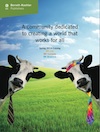- Explains why companies must put resource scarcity at the center of their overall strategic thinking rather than relegating it to their “green” division
- Lays out five principles for turning scarcity into opportunity
- Features examples of companies all over the world that are successfully sailing the overfished ocean
We all know the proverb about teaching someone to fish, but if there are no fish left, knowing how to catch them won’t do you any good. And that’s the position businesses are in today. Resources are being depleted at an alarming rate. The cost of raw materials is rising dramatically. We are, simply put, running out of things to take and places to trash.
To survive in the long term, says Nadya Zhexembayeva, businesses need to make resource scarcity—the overfished ocean—their primary strategic consideration, not just a concern for their “green” division. Those managers who deeply understand and master this shift will be able to turn the new reality into a remarkable competitive advantage.
Overfished Ocean Strategy offers five essential principles for innovating in this new reality. Zhexembayeva shows how businesses have been finding new opportunities in what were once considered useless by-products, discovering resource-conserving efficiencies up and down their value chain, transferring their expertise from physical products to services, and developing ways to rapidly try out and refine these new business models. A business owner herself, Zhexembayeva fills the book with examples of companies that are already successfully navigating the overfished ocean, from established corporations such as BMW, Microsoft, and Puma to newcomers such as Lush, FLOOW2, and Sourcemap.
The linear, throwaway economy of today—in which we extract resources at one end, create products, and throw them away at the other—is rapidly coming to an end. A new economy is being born, one that takes this line and turns it into a circle. In every industry, creative minds are learning how to make money from reducing rather than expanding. Nadya Zhexembayeva shows how you can join them and avoid being left high and dry.
 0 items in cart
0 items in cart









